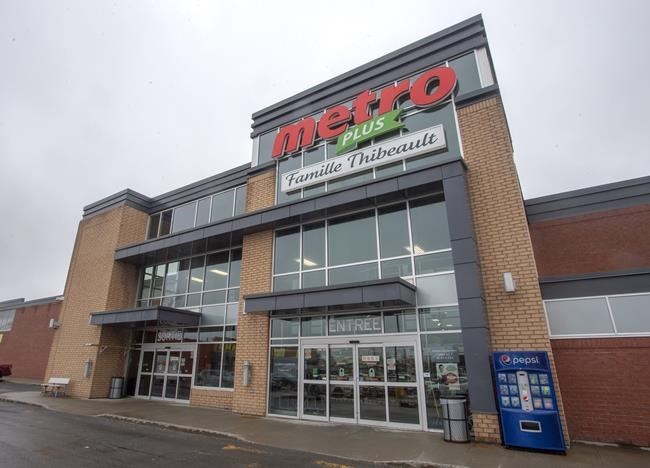One of Canada's largest grocery store chains has seen sales level off after the arrival of the COVID-19 pandemic sent shoppers flocking to grocery stores, but Metro Inc.'s CEO says revenue is still up and is expected to help pay for elevated operating costs associated with the outbreak.
The grocery and drug store company saw mass stockpiling at the end of its second quarter, which finished March 14, as the World Health Organization declared the coronavirus a pandemic.
Customers started a buying frenzy in Ontario on Feb. 28, said CEO Eric La Fleche, during the company's second-quarter conference call with analysts Wednesday morning. He's not clear what happened that day to spark the spree, but shoppers rushed to buy cleaning supplies, hand sanitizers and toilet paper.
Quebec shoppers followed suit the next week.
The company's food same-store sales, a key retail metric, for the quarter jumped 9.7 per cent. The company estimates that figure would be 5.2 per cent without the impact of COVID-19.
Sales for the quarter totalled $3.99 billion, up from $3.70 billion a year prior and a 7.8 per cent increase. Metro estimates $125 million or three cents per share of the increase came from the pandemic, said chief financial officer Francois Thibault. The rise in sales would be 4.4 per cent without the coronavirus impact.
This surge continued for the first week of the company's third quarter at its food and pharmacy locations, said La Fleche.
"The sales have since levelled off, but we are still experiencing significant increases in revenues due to the pandemic," he said.
Between March 15 and April 11, the company saw same-store food sales rise 25 per cent compared to the same time last year.
While customers are shopping less frequently, they are buying significantly more with "a much bigger and fuller shop," he said, adding Metro expects that to continue for some time — so long as customers remain confined to their homes as much as possible with many sectors of the economy, including restaurants, closed for the most part.
The larger customer basket size has translated to a higher average price per item and a lower percentage of goods sold on promotion, partly due to certain suppliers requesting Metro stop or reduce promotional activity to avoid straining the production line and supply chain further, said La Fleche.
The company's pharmacies are not faring as well. Prescription sales are holding compared to last year, he said, but there has been a decline in front-store sales at pharmacies partly due to safety measures that have reduced physical access to these stores.
Same-store sales in this area in the first period of the company's third quarter fell nine per cent compared to last year and has been trending down, he said, but the company expects improvement as commercial activities are expanded gradually in the future.
"However, we are also incurring higher operating expenses," he said, listing off additional labour costs, including increases in pay and staffing numbers, as well as costs related to enhanced safety measures, maintenance and cleaning.
The company expects to continue to incur these costs in the next months.
"We expect that our sales will be strong enough to justify supporting those expenses going forward."
It's possible some of these safety measures will remain in place beyond the current pandemic, as will the associated operating expenses.
"Customers are going to be expecting more from us," said La Fleche.
The company's second-quarter profit rose to $176.2 million or 69 cents per diluted share for the 12-week second quarter compared with a profit of $121.5 million or 47 cents per diluted share in the same quarter a year earlier.
Pharmacy same-store sales rose 7.9 per cent or 6.4 per cent excluding the COVID-19 impact.
On an adjusted basis, Metro earned $182.8 million or 72 cents per share for its second quarter, up from an adjusted profit of $155.1 million or 60 cents per share a year ago.
Analysts on average had expected a profit of 74 cents per share, according to financial markets data firm Refinitiv.
This report by The Canadian Press was first published April 22, 2020.
Companies in this story: (TSX:MRU)
Aleksandra Sagan, The Canadian Press



